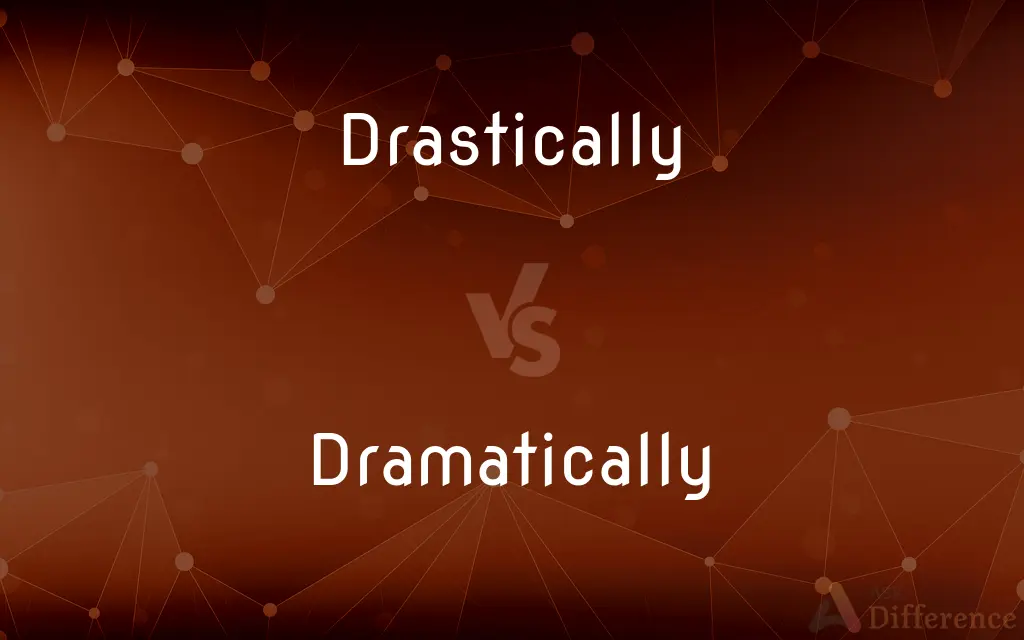Drastically vs. Dramatically — What's the Difference?
By Tayyaba Rehman & Maham Liaqat — Updated on March 15, 2024
Drastically implies extreme and often sudden changes, while dramatically emphasizes impactful, striking changes that catch attention.

Difference Between Drastically and Dramatically
Table of Contents
ADVERTISEMENT
Key Differences
Drastically refers to changes that are severe, radical, or extreme in nature, often associated with actions that lead to significant alterations or consequences. These changes can be sudden and may sometimes have negative connotations, suggesting a departure from the norm that requires substantial adaptation. On the other hand, dramatically conveys a sense of impactful, noticeable change that is often surprising or impressive, commonly used to describe changes that are striking in their contrast to previous states, without necessarily implying a negative outcome.
When something changes drastically, it usually undergoes a profound transformation that can be shocking or unsettling. This term is often used in contexts where the change is so significant that it alters the foundational aspects or expected outcomes. Whereas, changes described as dramatic might not alter the foundational aspects but are notable for their scale or intensity, captivating attention due to their pronounced nature.
Drastic changes are typically associated with actions that require a significant level of intervention or effort, suggesting that the change was not only necessary but also urgent. For example, a drastic reduction in spending suggests cutting costs in a severe and potentially sustainable manner. In contrast, a dramatic increase in performance might imply a notable improvement that, while significant, doesn't necessarily convey the same level of urgency or severity as a drastic change.
In literature or storytelling, a dramatic twist refers to a sudden and surprising turn of events that captivates the audience, enriching the narrative without necessarily implying a negative turn. Conversely, a drastic turn in a story would suggest a severe, possibly disturbing change in the storyline, significantly altering the direction or outcome of the narrative.
The choice between using 'drastically' and 'dramatically' depends on the context and the nature of the change. While both imply significant change, 'drastically' leans more towards extreme, often negative alterations, and 'dramatically' emphasizes the impactful, noticeable nature of the change.
ADVERTISEMENT
Comparison Chart
Connotation
Extreme, severe change, often with negative implications.
Impactful, noticeable change, not necessarily negative.
Type of Change
Profound transformation, altering foundational aspects.
Significant but not necessarily foundational change.
Urgency/Severity
Implies a high level of urgency or necessity for the change.
Change is notable for its scale or intensity, but less urgent.
Context of Use
Often used in serious, potentially negative contexts.
Used in contexts emphasizing the impact or scale of change.
Example in Literature
A drastic turn in a story might lead to an unexpected, bleak outcome.
A dramatic twist in a narrative captivates with its surprising nature.
Compare with Definitions
Drastically
Drastically means making extreme changes.
To solve the crisis, they had to cut costs drastically.
Dramatically
Dramatically refers to significant, noticeable changes.
Her performance improved dramatically after the coaching.
Drastically
Drastic measures imply severe actions.
The company took drastic measures to avoid bankruptcy.
Dramatically
Dramatically can mean emotionally impactful.
The movie ended dramatically, leaving the audience in awe.
Drastically
A drastic change can be unsettling.
The landscape changed drastically after the storm.
Dramatically
Dramatic changes catch the eye.
The renovation made a dramatic difference to the old house.
Drastically
Drastically can imply a negative shift.
The quality of the product has decreased drastically over time.
Dramatically
Dramatically does not always imply negativity.
Sales rose dramatically due to the successful campaign.
Drastically
Drastically often conveys a sense of urgency.
The health recommendations changed drastically due to the outbreak.
Dramatically
A dramatic increase emphasizes a striking change.
There was a dramatic increase in attendance this year.
Drastically
Extreme in effect; severe or radical
The drastic measure of amputating the entire leg.
Drastic social change brought about by the French Revolution.
Dramatically
Of or relating to drama or the theater.
Drastically
Acting rapidly or violently
A drastic emetic.
Dramatically
Characterized by or expressive of the action or emotion associated with drama or the theater
A dramatic rescue.
Drastically
To a drastic degree.
This recession has been drastically different.
Drastically reduced prices
Dramatically
Arresting or forceful in appearance or effect
A dramatic sunset.
Drastically
In a drastic manner.
Lisa always wore shorts and a T-shirt, which clashed drastically with her brother's thick winter coat.
Dramatically
(Music) Having a powerful, expressive singing voice
A dramatic tenor.
Drastically
In a drastic manner
Dramatically
In a dramatic manner.
Dramatically
In a dramatic manner; theatrically; vividly.
Dramatically
In a very impressive manner;
Your performance will improve dramatically
Dramatically
In a dramatic manner;
He confessed dramatically
Dramatically
With respect to dramatic value;
The play was dramatically interesting, but the direction was bad
Common Curiosities
Is a drastic change always negative?
While 'drastic' often has negative connotations, the term itself is neutral and can refer to any extreme change, positive or negative.
How does drastically affect interpretation?
Using 'drastically' can emphasize the severity and extremeness of a change, affecting the interpretation towards seeing the change as radical or significant.
What are drastic measures?
Drastic measures are severe actions taken to address a problem, often seen as last resorts due to their extreme nature.
What is a dramatic effect?
A dramatic effect is a striking, noticeable impact that significantly enhances or changes the subject in question.
How does a dramatic change differ from a drastic one?
A dramatic change emphasizes the impactful and noticeable nature of the change, while a drastic change highlights its extreme, severe character, often with a connotation of urgency or negativity.
Can a situation improve drastically?
Yes, a situation can improve drastically, though the term often implies a radical or extreme improvement.
What does a dramatic increase mean?
A dramatic increase refers to a substantial and noticeable rise in quantity, quality, or intensity.
What does it mean to change drastically?
To change drastically means to undergo a severe, significant transformation that markedly alters the original state or condition.
Can dramatically be used positively?
Yes, 'dramatically' can be used positively to describe significant improvements or impressive changes.
Is a dramatic change always sudden?
A dramatic change can be sudden but may also occur gradually if the end result is strikingly different from the starting point.
Share Your Discovery

Previous Comparison
Dah vs. Dit
Next Comparison
Caliph vs. SultanAuthor Spotlight
Written by
Tayyaba RehmanTayyaba Rehman is a distinguished writer, currently serving as a primary contributor to askdifference.com. As a researcher in semantics and etymology, Tayyaba's passion for the complexity of languages and their distinctions has found a perfect home on the platform. Tayyaba delves into the intricacies of language, distinguishing between commonly confused words and phrases, thereby providing clarity for readers worldwide.
Co-written by
Maham Liaqat













































